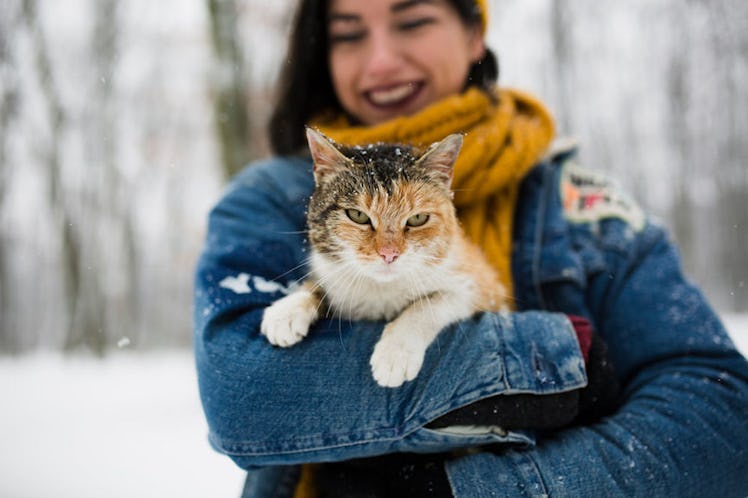
If You've Ever Wondered Whether Catnip Is Bad For Your Cat, Here's What You Need To Know
The first time I gave my cat Kit Kat catnip (say that five times fast), I have to admit that I was pretty worried. I'd heard wild tales of how even the tiniest pinch of the stuff could transform your cat's behavior almost beyond recognition, so I wasn't that sure how I felt about it. But I knew that cats usually love the stuff, so I decided to give it a try. Long story short, he was obsessed, and much more active than usual, for all of about five minutes, anyway. But is catnip bad for cats? If you've ever wrestled with the ethics of whether to introduce your kitty to the treat, there are a few things you should know ahead of time before you and your fur baby dive in.
First of all, you might be wondering what catnip even is. It's a plant from the mint family, according to The Humane Society, and its dried form can be found in a number of cat toys and treats. Partaking of the plant — either by smelling it or by actually eating it straight — can lead to a variety of behaviors, from aggression, to rolling around, and even growling.
If your cat doesn't seem very impressed by the catnip-filled toys you bought her, though, there's definitely no need to worry. Catnip sensitivity is hereditary, and an estimated 50 percent of cats have no reaction to the plant at all, according to The Human Society. Also, if your fur baby is under 6 months old, she probably hasn't matured enough to have a response.
As per The Humane Society, giving your cat catnip that they can smell, as opposed to the kind they can actually eat, can make them respond very differently. While being able to rub against something containing the plant targets feline "happy" receptors in the brain, chowing down on catnip can alternatively mellow your cat out, according to the organization.
When it comes to any animal-related ethical dilemmas, the first organization that comes to my mind is People for the Ethical Treatment of Animals (PETA), and it turns out that they've actually addressed this very question. “PETA is all for treating cat companions to reasonable amounts of high-quality catnip," PETA media officer Sophia Charchuk told The Conversation, "and for keeping them indoors, where they’ll be safe from cars, contagious diseases, predators, and cruel humans and able to enjoy toys (including those filled with catnip) for years to come.”
Even so, if you've been struggling with the issue of whether it's OK to give your kitty what is, essentially, a drug, here's some info that might settle your mind a bit: According to Scientific American, the plant isn't addictive, so there's no need to worry that you're encouraging a bad habit for your pet. In fact, any "high" that your cat feels will only last for about 10 minutes, so it's definitely a different ballgame than marijuana. (In case you're wondering, humans can't get high off of catnip the way their feline friends can, though apparently, you might be able to benefit from some of its health effects, as "catnip is commonly recommended by herbalists to lessen migraine headaches and to relieve cramps, gas, indigestion, insomnia," among other wellness issues, according to Scientific American.)
If you're still feeling unsettled about treating your sweet cat to catnip, it's totally fine to stick with fishy treats and a good ol' ball of yarn. But if you would like to experiment with it, just make sure to pay attentive to how your feline friend is acting during and after a catnip session. "Be mindful of overindulgence though — cats are unlikely to overdose on catnip, but they can get sick if they eat too much," suggests The Human Society. "Trust your kitty to know when they've had enough."